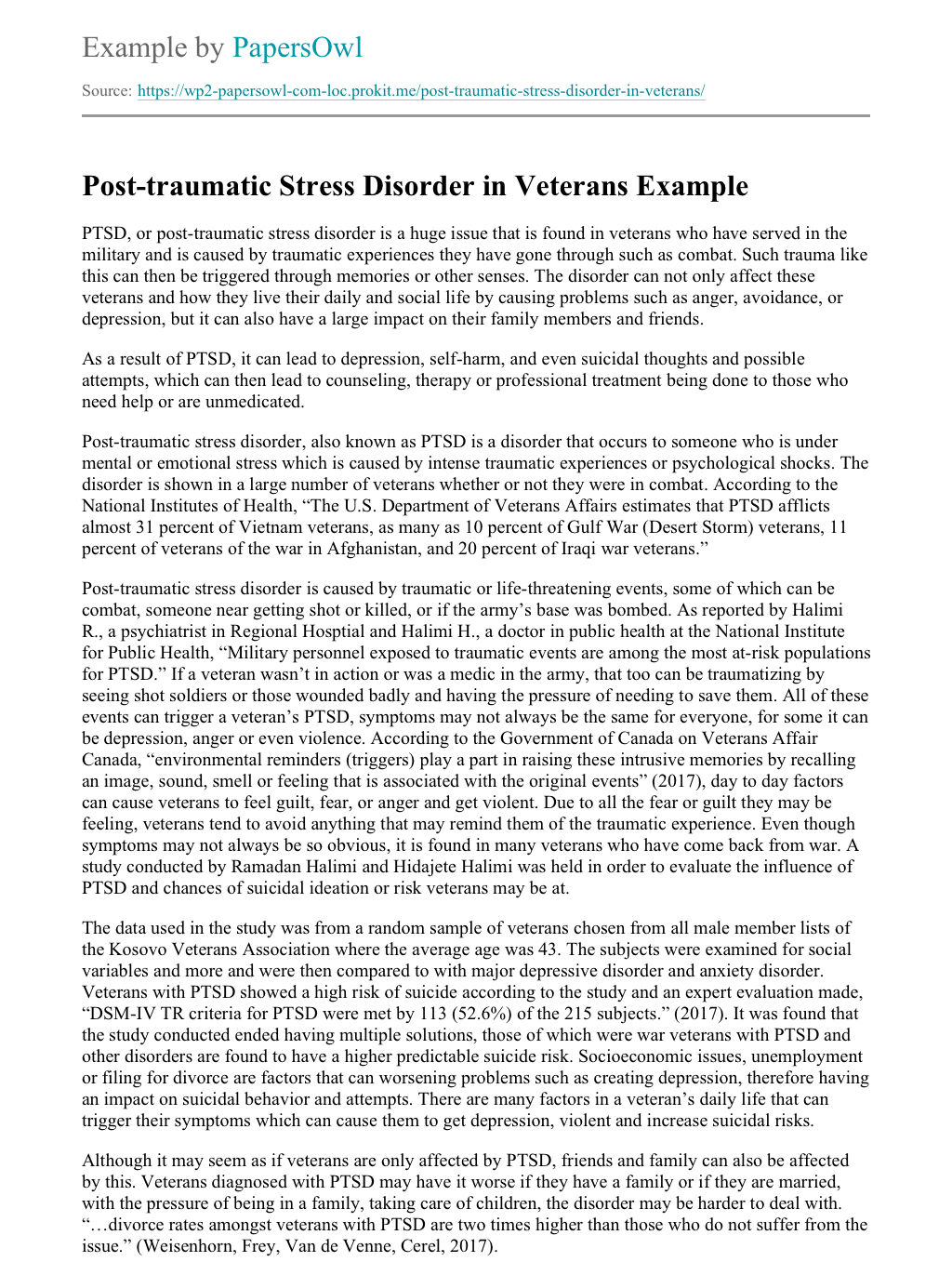
How common is PTSD?
· PTSD is a mental disorder that may develop after exposure to exceptionally threatening or horrifying events. Many people show remarkable resilience and capacity to recover following exposure to trauma. 1 PTSD can occur after a single traumatic event or from prolonged exposure to trauma, such as sexual abuse in childhood Some people develop post-traumatic stress disorder (PTSD) after experiencing a shocking, scary, or dangerous event. It is natural to feel afraid during and after a traumatic situation. Fear is a part of the body’s normal “fight-or-flight” response, which. helps us avoid or respond to potential danger. People may experience a range of Both the hippocampus and the amygdala must function properly to help a person process life’s events Some studies have shown those with PTSD to have a smaller hippocampus, although, whether this is a cause or result of PTSD is not yet known How a person perceives and stores memory of the traumatic event is critical in determining whether or not he or she will develop Estimated Reading Time: 8 mins

Plain language summary
Both the hippocampus and the amygdala must function properly to help a person process life’s events Some studies have shown those with PTSD to have a smaller hippocampus, although, whether this is a cause or result of PTSD is not yet known How a person perceives and stores memory of the traumatic event is critical in determining whether or not he or she will develop Estimated Reading Time: 8 mins · PTSD is a mental disorder that may develop after exposure to exceptionally threatening or horrifying events. Many people show remarkable resilience and capacity to recover following exposure to trauma. 1 PTSD can occur after a single traumatic event or from prolonged exposure to trauma, such as sexual abuse in childhood Post-traumatic stress disorder (PTSD) is a severe psychiatric illness which may develop in individuals exposed to trauma [1], including exposure to military combat, interpersonal violence, and childhood maltreatment. The disorder is more by Vadim Tseilikman 11 Ordinary Differential Equations, Dynamical Systems, Metabolism, Oxidative Stress

What is post-traumatic stress disorder (PTSD)?
Some people develop post-traumatic stress disorder (PTSD) after experiencing a shocking, scary, or dangerous event. It is natural to feel afraid during and after a traumatic situation. Fear is a part of the body’s normal “fight-or-flight” response, which. helps us avoid or respond to potential danger. People may experience a range of In its gravest form, this response is diagnosed as a psychiatric disorder consequential to the experience of traumatic events. Post-traumatic stress disorder, or PTSD, is the psychiatric disorder that can result from the experience or witnessing of traumatic or life-threatening events such as terrorist attack, violent crime and abuse, military combat, natural disasters, serious accidents or violent personal assaults 4 Pages Open Document Post-Traumatic Stress Disorder Most of have heard the term Post-Traumatic Stress Disorder or PTSD. The Nebraska Department of Veterans Affairs estimate that percent of Americans will experience PTSD at some point in their lives. We commonly associate PTSD with soldiers who have fought in wars

Noradrenergic System
4 Pages Open Document Post-Traumatic Stress Disorder Most of have heard the term Post-Traumatic Stress Disorder or PTSD. The Nebraska Department of Veterans Affairs estimate that percent of Americans will experience PTSD at some point in their lives. We commonly associate PTSD with soldiers who have fought in wars Post-traumatic stress disorder (PTSD) is a severe psychiatric illness which may develop in individuals exposed to trauma [1], including exposure to military combat, interpersonal violence, and childhood maltreatment. The disorder is more by Vadim Tseilikman 11 Ordinary Differential Equations, Dynamical Systems, Metabolism, Oxidative Stress Some people develop post-traumatic stress disorder (PTSD) after experiencing a shocking, scary, or dangerous event. It is natural to feel afraid during and after a traumatic situation. Fear is a part of the body’s normal “fight-or-flight” response, which. helps us avoid or respond to potential danger. People may experience a range of

Introduction
· The Findings from Neuroimaging Post-Traumatic Stress Disorder Researchers have conducted many research projects using different modes of neuroimaging, including fMRI, PET, and newer forms of visualizing the brain come · Medication and placebo response occurred in % (N = ) and % () of patients, respectively. Of the medication classes, evidence of treatment efficacy was most convincing for the SSRIs. Medication was superior to placebo in reducing the severity of PTSD symptom clusters, comorbid depression and disability Post-traumatic stress disorder (PTSD) is a severe psychiatric illness which may develop in individuals exposed to trauma [1], including exposure to military combat, interpersonal violence, and childhood maltreatment. The disorder is more by Vadim Tseilikman 11 Ordinary Differential Equations, Dynamical Systems, Metabolism, Oxidative Stress
No comments:
Post a Comment